In today’s world, safety and security are paramount when it comes to the design and construction of modern homes. Among the many safety features that homeowners must consider, residential fire protection systems stand out as an essential aspect of any home’s security infrastructure. With the increasing complexity of household technologies, the growing threat of fires, and the rising awareness about fire safety, it is crucial to integrate advanced fire protection systems into homes. This article explores the significance of residential fire protection systems, the various types available, and why they are indispensable in modern homes.
The Growing Importance of Fire Safety
Fires pose a significant risk to both property and human life. According to the National Fire Protection Association (NFPA), fire departments in the United States respond to more than 350,000 home fires annually. The impact of a fire goes beyond structural damage; it can lead to tragic loss of life and extensive injuries. In many cases, the absence of adequate fire safety measures exacerbates the damage.
As homes become larger and more complex, with advanced electrical systems, modern heating appliances, and flammable materials, the risk of fire is increasing. The traditional methods of relying on fire extinguishers and smoke detectors are no longer sufficient to ensure the complete safety of a home. This is where residential fire protection systems play a pivotal role.
Comprehensive Protection Against Fires
Residential fire protection systems are designed to prevent, detect, and suppress fires. These systems are comprehensive and often include a combination of detection devices, suppression mechanisms, and alarms. Some of the primary components of these systems include:
1. Smoke Detectors and Fire Alarms
Smoke detectors are one of the most common and vital components of residential fire protection systems. They are responsible for detecting the early signs of fire, such as smoke, and alerting the inhabitants of a potential danger. Modern smoke detectors are highly sensitive and capable of detecting even the smallest traces of smoke, which can significantly reduce the risk of fire-related casualties.
When integrated with a fire alarm system, these detectors can immediately alert residents to evacuate the premises and notify local fire departments for a rapid response. Fire alarms can also be linked to other safety systems, such as sprinkler systems, to activate suppression methods.
2. Fire Suppression Systems (Sprinklers)
Sprinkler systems are one of the most effective ways to limit the spread of fire within a home. Once a fire is detected, sprinkler heads release water to contain or extinguish the flames. Residential sprinkler systems are particularly advantageous in homes with multiple floors or larger areas, as they can suppress a fire quickly before it has a chance to spread uncontrollably.
Moreover, modern sprinkler systems are designed to only activate in the area where heat or fire is detected, preventing unnecessary water damage in other parts of the home.
3. Fire Extinguishers
While not always a part of larger fire protection systems, portable fire extinguishers are an essential element of residential fire safety. Homeowners should keep extinguishers in key areas such as kitchens, garages, and near electrical equipment. They can be used to quickly control small fires before they escalate into more severe situations.
Benefits of Residential Fire Protection Systems
The installation of residential fire protection systems offers numerous advantages that enhance the overall safety and well-being of a household.
1. Enhanced Safety for Families
The primary benefit of residential fire protection systems is the enhanced safety they provide for families. Early detection and prompt suppression of fire can be life-saving. With fire alarms, detectors, and sprinklers, families have more time to evacuate safely, reducing the risk of injury or death during a fire emergency.
2. Minimizing Property Damage
Beyond protecting lives, residential fire protection systems are also effective in reducing property damage caused by fires. Sprinkler systems, for example, can quickly control the fire’s spread, limiting the area of damage and reducing the costs of repairs and reconstruction. The quicker a fire is suppressed, the less devastating its impact will be on the property.
3. Insurance Benefits
Insurance companies often offer discounts to homeowners who have installed fire protection systems. This is because these systems significantly reduce the risk of large-scale damage. With fewer fire-related claims, insurance companies are more inclined to provide lower premiums to policyholders with advanced fire safety measures in place.
4. Peace of Mind
Knowing that a home is equipped with a modern fire protection system brings peace of mind to homeowners. Fire is an unpredictable hazard, but having the right systems in place ensures that families are well-protected in case of an emergency.
Conclusion
As modern homes grow in size and complexity, ensuring fire safety becomes more critical than ever. Residential fire protection systems are no longer optional; they are a necessity. These systems offer peace of mind, enhance safety, minimize property damage, and even reduce insurance costs. Whether through smoke detectors, sprinklers, or fire extinguishers, the integration of these systems in every home can prevent tragedy and provide a safer living environment for all. As such, investing in a comprehensive fire protection system is one of the wisest decisions a homeowner can make in today’s world.


